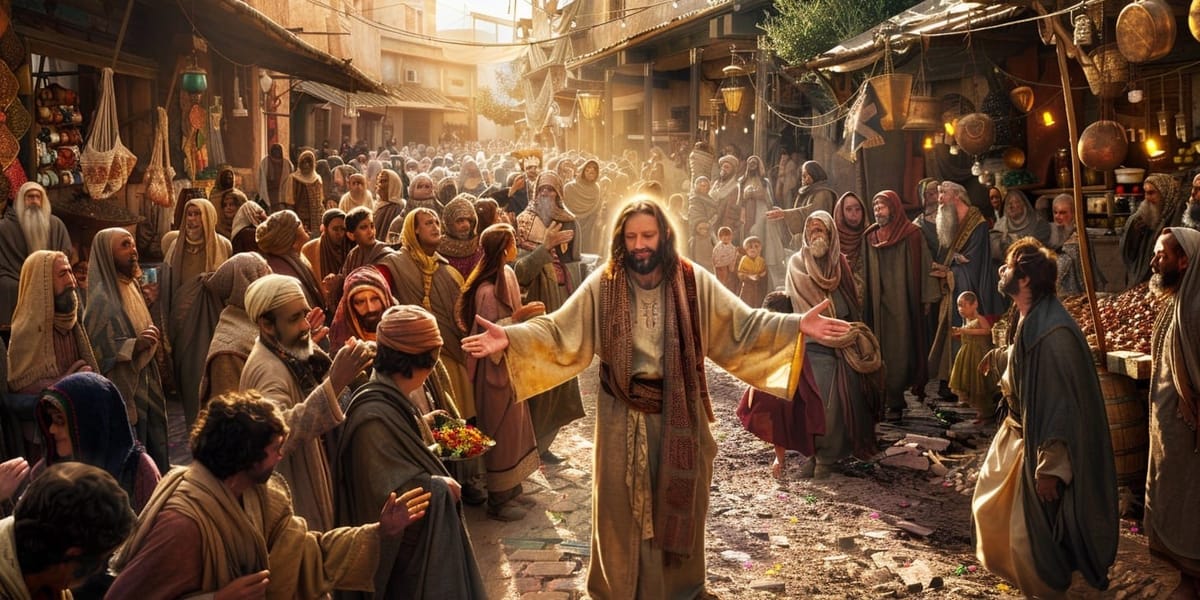Fairhaven Sermon 7-7-2024
Jesus Christ is going out into his world to find anyone that is broken, going through hard times, sick, sad, or frustrated. His singular purpose is to heal, to love, and to help those going through tough times in life.

In this week's service, Rev. Bob Moffat delivered a sermon focusing on the central message of the Bible, particularly as conveyed in the Gospel of Mark. He emphasized Jesus' ministry as depicted in the first five chapters of Mark, highlighting Christ's relentless pursuit of those who were broken, sick, or marginalized. Rev. Moffat stressed that Jesus' primary purpose was to heal, love, and help those going through tough times, bombarding the world with kindness rather than judgment or demands.
Rev. Moffat also shared personal anecdotes from his time in seminary, including an impactful course that required him to engage with people in need rather than study theological texts. He concluded by emphasizing that the core of Jesus' message is God's care, kindness, and love for all people, especially those who are hurting. The sermon encouraged parishioners to embrace childlike joy and to trust in God's unwavering love and grace, regardless of their circumstances.
Transcript
I don't know whether you all have ever noticed, but I'm pretty sure you have through your years in developing as a Christian and working more and more at just wanting to become a servant of God and a faithful messenger of God and someone who believes in God, but at the same time is a follower of God. And this book probably, not probably, this book more than any other single book gives us the indication of what that's all about. You know, what does it mean to be faithful to God, to be a follower of God, to follow in God's ways? But I spent my whole life, because this book is, it's a big book, it's over a thousand pages long, the Old Testament and the New Testament, there's just endless numbers of long and beautiful stories, but I've literally spent my whole life asking the question, Is there some way to get down to the nub of the whole thing? Is there some way to find, you know, what is the central message of what this book of over a thousand pages that God has given us? Is there a central message there that we can really nail down and figure out in terms of, you know, what's God wanting for us? And so that literally in a sense every day as we walk out the front door of our house, we can think about that message that God is wanting to get through to us in regard to our lives. When we come to church on Sunday, what's the central message that God's wanting to nail down with us? Well, this morning's scripture that I'm preaching from is from the Gospel of Mark, chapter 6.
And as I was studying Mark, I think I came a little bit closer to that whole concept, that whole issue, what is the central message of God? And what I decided to do is something that they always taught us to do in seminary. The scripture this morning is Mark, chapter 6, but they always said in seminary, you know, always look at the broader message that's going on that you're preaching about or reading about in the scripture. In other words, just don't take Mark, chapter 6, but look at Mark, chapter 5 and Mark, chapter 7, and then, you know, go back a little bit further. But as much as you can, surround that passage that you're looking at with other passages that are going on in regard to that particular book and that particular message.
So I started reading Mark, and I love the book of Mark. One of the reasons I love it is because it's the first book that was written about Jesus after he carried on his ministry. So in a sense, the writer of the Gospel of Mark is somebody who had closer ties to Jesus probably than any other writer in the Gospel. He very quickly, after Jesus Christ had ascended into heaven, began to write down all of the things that Jesus Christ was doing in regard to his ministry.
And so it's the shortest book, but in a sense, it's the book that, for example, Matthew, borrowed from, and it's the book that Luke borrowed from particularly in writing their Gospels because they felt that he was more accurate than anybody else in getting that message across. And so I started to dig in. It had been a while, really, since I had been studying seriously the Gospel of Mark. I've read it many times, but it had been, you know, a couple of years where I really thought I'll just dig in and read carefully.
And as I was looking at the passage, Mark chapter 1, Mark chapter 2, Mark chapter 3, Mark chapter 4, Mark chapter 5, it suddenly occurred to me, at least for me in a pretty dramatic way, that all five of those chapters that precede this morning's Scripture have to do with the one singular reality that Jesus Christ is going out into his world, which is obviously Jerusalem and Israel and Palestine. Jesus is going out into his world, just like we would be going out into the community of Pittsburgh. Jesus is going out into his world, and he's breaking into the lives of dozens upon dozens upon dozens of people. All five chapters, basically.
Jesus Christ is going into the world of these people that are a part of his world, and his singular purpose is to find anyone in any situation, anywhere, that is broken, that is going through hard times, that is sick, that is sad, that is frustrated. For five chapters, chapter 1 through 5, Jesus talks and acts with one singular purpose. His purpose is to heal, his purpose is to love, his purpose is to help those that are going through their tough times in life. And Jesus just relentlessly pursues, I hate to use the word bombard because it's often related to it in a more negative way, but in this case, Jesus literally bombards the world of Israel with his kindness and his love.
He passionately chases down everybody who other people are hating, and he says, I love you, and forget about that absurd hatred that those people are feeling. He'll pursue people who are blind and who haven't had any sight for years and years and years, and bring them vision and the ability again to see. He'll look for people that are crippled, those that are just not able in any sense to get around anywhere, oftentimes many people that were paralyzed, and he gives them instantaneously through his healing the ability to again walk and just get around with all of their loved ones and friends. He finds people that have these incurable diseases or these diseases that even just go on for decades and decades, and they're living in this state of despair.
And Jesus goes again and again and again and reaches out and touches upon the shoulders or the body of these people that are going through these terrible illnesses, and he restores their body perfectly from these illnesses. Dozens upon dozens upon dozens of people that are discovering God's love and God's hope and God's healing. I think it's also secondarily worthwhile saying that what we see very, very little of from the words of Jesus and from his message during this period of time when he began his ministry, almost never during this probably close to the first half of his ministry do you hear words like, You ought to do this. You should do this.
You better obey me. You better act like this or else. Jesus doesn't convey the message of the gospel of Jesus Christ, at least in this section of the gospel of Mark in those words. And I think finally maybe it would be to say simply this, that more than any other single act or any other single sermon, Jesus came into the world in which he lived as God and as a representative of his Father God and as a representative of the Holy Spirit to bring kindness into the lives of people, into the lives of all people, to bring kindness, to bring hope, to bring love, and to bring joy.
It just saturates all aspects of Jesus' life and behavior, his relationship to his apostles. When we read, as you heard this morning, Scripture about Jesus Christ as he has chosen his disciples and what he is saying to them now is, Okay, you've seen me heal. You've seen me bring to life people whose lives were broken and shattered and in terrible sets of circumstances. Now you go out and I empower you to bring life, to bring healing, to bring sight, to bring the ability to walk, the ability to overcome hatred that those people have experienced, and you now communicate that to the world.
Which is, I would say, secondarily that Jesus Christ invites us and desires us as well to show and to speak of that kindness to all of the people that we encounter in our world. We live in a world that has a lot of brokenness. There's not a single time that we drive down the intersection, you know, just a couple of maybe 50 feet above where, you know, we worship, and there's a homeless person or a poor person or a desperate person who has a sign out, and basically the sign says a lot of different things. I heard, or I'm homeless, or I'm hungry.
But that is spread across Pittsburgh, that is spread across the whole world exactly in the same way that it was spread across Palestine, that it was spread across Israel, that it was spread across all of those areas of Galilee where Jesus did his preaching, and Jesus Christ pursued particularly and singularly the people that felt God was not getting, that they were not getting access to God's hope and message and love. Years ago, I hate to admit it, but now it's about 50 years ago, but I was attending seminary, and obviously I felt that call from God. I wanted to serve God. My dad was a minister 40 years, 50 years, my brother was a minister for 40 years, and I just felt just a distinct calling from God to be able to become a pastor, and I served for 40 years.
And so I went to seminary, and I loved it, and I enjoyed it. I mean, I just had the greatest group of friends and fellows, and it was just a wonderfully kind experience. But about halfway through seminary, I'm not proud to admit it, but I got a little bit discouraged. I got pretty discouraged, because we were having to just take dozens and dozens of courses on these very complicated theological and biblical concepts.
I mean, these books that we were reading were not just about the Bible, but they were books that had seven, eight, nine-syllable kind of words, basically in this seminary setting where we were trying to get a master's degree, trying to communicate the meaning of the gospel of Jesus Christ. But about halfway through, I thought, You know, I'm getting burned out, because these books are just so intensely complicated and intensely theological, you know, as they were saying to us. And I honestly was thinking, Maybe I'll take a year's break, or maybe I'll even just go off and do ministry without that so-called master of divinity degree and serve God, but not worry about that, because the intensity of those books were kind of wearing me down. But the next course I took in seminary was a guy by the name of Dr.
Baddorf, and he preached from -- his course was on the New Testament, but it was also a course about what he called the social gospel. And I remember that day when I walked into his class, and Dr. Baddorf, you know, he pointed his finger at us, and I thought, Uh-oh, here comes, you know, theology book number 719 in terms of having to read and think about and figure out all these little complicated concepts. But he literally -- I'm exaggerating -- in a very kind way, he said, I want to let you know this morning that when you take my course, there is not one single book I'm going to ask you to read.
There's no book. There's nothing that is going to come in terms of this theological concept or this complicated theological set of realities. But he said, What I do want you to do is instead of books, I want you to find people. And your assignment is going to be to find people in our community that need to be seen and heard.
I want you to find people in our community and spend a lot, a whole lot of time with those people, not just this week, not just next week, but for the next year or two years. I want you to find people that are going through not particularly great times, and to experience and to let them experience your love and your kindness toward them. The very first thing we were asked to do in that class was to become, for one weekend, a homeless person. And he sent us out into the community and he said, For one weekend, don't go into your dorm room.
You go and you roam around the city of Dayton and you beg for food. You beg for a bed to sleep in at night. It was a pretty anxious weekend, but we all did it. And we all went around the city of Dayton and we roamed and we found some people that were willing, and we found, obviously, shelters that were intended specifically for the homeless.
But then, immediately after that, I went and I found what was called a coffee shop. And I guess even to this day, it is called a coffee shop. But it was a wonderful group of people that met every Friday night as the weekend began. And they would -- there were about 20 or 30 of these folks that were made up of a part of this coffee shop.
Some of them were people that were recovering alcoholics. Some of them were people that were still alcoholics wanting to recover but not successfully achieving that. There was a lady who was a victim, had been a victim for many, many years of sex trafficking. And she now was in a process of recovering, but even at one stage during those years, she had attempted suicide.
She was so broken by her experience. There were people who were faithful members of a church. There were some people who had never during their entire life darkened the doors of a church. But the wonderful thing was, these were real people.
And these were people that cared for each other. These were people that it was really easy for me to discover that I could care for. And these were people that were very willing in their way to be able to care for me. But they were all folks who could be described as almost identical to the hardships of life, just like the ones that Jesus encountered repeatedly in the Gospel of Mark.
But it restored my sense of calling. I finally said to myself after this time together with these people in the coffeehouse where they would tell their struggles to me, and they allowed me to tell about my struggles for them, that I began to say again, That powerful spark of the calling of the message of Jesus Christ has been revived in my soul. It was like a resurrection of my calling in which God said, I knew what you were needing, and this is the way in which God is calling us. In a sense, again, it was to reinforce everything that we find and we read about in the Gospel of Mark.
Going out, reaching, and God manifesting His caring, kind, loving, understanding, forgiving spirit to the people of this world that are desperate to know that the starting point of God's ministry, the starting point of Jesus' ministry, the ending point of God in Jesus' ministry is kindness, it's caring, it's love, and it's grace. The second thing I think that clarified for me the message of the Gospel of Jesus Christ is another passage in the Bible in which Jesus Christ just very, I think, succinctly says to those that are following Him, He said, Unless you become like children, you are not worthy of the kingdom of God. I'd like you to just kind of let that sink in for a little bit this morning. What does that really mean, Unless you become like little children, you are not worthy of the kingdom of God? Well, I've raised two kids, and I know what children are like, and you and I all know, you know, as we go out into the real world, you know, you go to the malls, you go walking up and down whatever street it is we live on, there are little kids.
But what do you see when you see little kids more than anything else? More laughter than just about any other kind of behavior, more joking, kidding, just kind of almost irrational happiness that goes on in regard to their life and in a way in which they communicate how they convey the message of God. I think in a way, it is Jesus Christ again saying to us what honestly is the central message that He is wanting to convey and to communicate to you and me in regard to what that gospel of Jesus Christ is about. It's about the reality that Jesus Christ likes sometimes more the silly things, more the jovial things, more the corny things than He likes the theological things, the complicated things of life. More importantly, it is to say Jesus Christ likes us to be able to carry out into the world a kind of a joyfulness and a hopefulness that God would like to see us convey in terms of our real world.
There's a true and a sort of a comical story that is told that was shared to me by a pastor. And this pastor had asked his confirmation class to write a journal in reflecting, the confirmation class was asked to reflect upon their feelings about the worship services they started attending it on a regular basis and then to write that down and to send and then to give the pastor these responses. What reflect on your feelings about the worship service? One young man wrote, he said, Dear Reverend, I liked your sermon Sunday, especially when it was finished. Love Ralph, age 11.
Dear Reverend, I like to go to church on Sunday because I don't have any choice. Love Margaret. Dear Reverend, thank you for your sermon Sunday. I will write more when my mother explains to me what exactly you said.
Love Justin. And dear Reverend, I think more people would come to church if you would move it to Disney World. Love Lauren. Well, these kids are on to something, I think.
I know we all understand that the essence of it is there are times when as we walk back into that real world, the conflicting realities of our life can crash in on us pretty quickly. Maybe the hurtfulness that quietly in an unspoken way is going on in our life. But I really believe the single most and powerfully important thing that Jesus wants to say to you and to me this morning and to every single person in every single church, every single person that's not in church this morning is, I care. That's the message.
That's the truth. That's the power of God's Word. And that is what God desires to get across to us in regard to our life. As I say, I was a pastor for 40 years.
My dad was a pastor for 40 years. My brother was a pastor. And we spent a lot of time talking back and forth. But I can tell you, there's a lot of hurt that goes on that is often invisible.
It's often quiet. It is often sad. Each of us brings this morning a lot of joy, but we also bring this morning certain elements of sadness that are there that are a part of the equation of life. And Jesus Christ is simply saying to us that in every sense, God just wants to break down the walls that in whatever way would separate us from Jesus so that He knows and we know that He comes to us this morning through His Holy Spirit in wanting to say, Please, please open your heart to me so that I can reveal to you, first of all, most of all, every day, in every way, my kindness, my graciousness, my love.
I always kind of find enjoyment in those words that Jesus Christ would say. Whenever people, whenever some of the official legal authorities that were surrounding Jesus and criticizing Him for the way in which He operated, He'd say, I came not for the religious people. I came for the sinners. I came for the hurting.
I came for the broken. And so Jesus Christ is basically saying to us this morning, There's nothing, there's nothing in all of the world that has the power to separate us from the love of Jesus Christ, our Lord, and His grace and His mercy. Let us pray. We thank you, God, for your gospel.
We thank you for your kindness. We thank you for your message of hope and joy. And help us always, Jesus Christ, to be trusting that above all, what you want to say to us this morning are the words that you care for us, you love us, and you desire more than anything else and nothing else but to be kind to us in our lives. In Jesus' name we pray, Amen.


